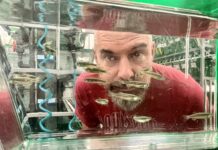Fortunately, summer also brings an abundance of tasty and nutritious foods, including berries, tomatoes, sweet bell peppers and protein-filled grilled fish and burgers. And by simply choosing the right foods to add to your daily diet, you can help prevent or alleviate the following common hot-weather woes:
DRY OR DAMAGED SKIN
You sweat more in the summer, so skin is less supple, plus, saltwater and chlorine have a drying effect. Sunburns and bug bites are also saboteurs of healthy skin.
What to eat: Help heal weathered skin with foods like raspberries, blueberries and strawberries, which are rich in antioxidants and vitamin C. Protein, in the form of lean meats, beans, nuts and seeds is also key. Keep dryness at bay by drinking lots of water. Since calcium can be lost through sweating, it’s a good idea to replace it by eating low-fat dairy products like skim milk, yogurt and cottage cheese.
PARCHED HAIR
Overexposure to sun, saltwater and chlorine can cause hair to become dry, brittle and dull.
What to eat: Toss some burgers or shrimp kabobs on the grill, or make a three-bean salad or other protein-rich meal because hair consists of protein fibers called keratin. Eating foods rich in vitamin B5 (yogurt and avocados), vitamin B8 (liver and cooked eggs), folic acid (fortified cereals and beans), calcium (milk and yogurt) and zinc (meat and fish) can reduce hair loss and replace dull hair with shiny hair. These nutrients also play a role in maintaining healthy skin.
MUSCLE CRAMPS
Muscle cramps result from overexertion and dehydration. When you don’t have enough fluid in your system, it leads to an electrolyte imbalance that causes your muscles to cramp. Sodium, calcium and potassium are the main electrolytes lost through sweating during exercise.
What to eat: Replenish electrolytes with a sports drink that contains them and drink water. Potassium-rich foods include bananas, raisins, potatoes and spinach.
EYE DAMAGE
Age-related macular degeneration is the most common cause of vision loss and blindness in people over the age of 55. This occurs when the central part of the retina (macula) becomes damaged.
What to eat: The retina is actually made up of vitamin A. Thus, foods rich in this vitamin—along with beta-carotene, zinc and Vitamins C and E—are beneficial to the eyes. Good sources are dark-green vegetables like kale, chard and mustard greens, plus bell peppers, carrots and blueberries. Eat eggs for their high dose of lutein, an important antioxidant that also helps prevent eye damage.
Source: WebMD
Editor’s Note: UofL Today reprints To Your Health articles from the “UofL Physicians-Insider” newsletter. Read the entire June Issue (opens as a PDF document).




























